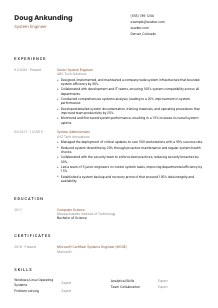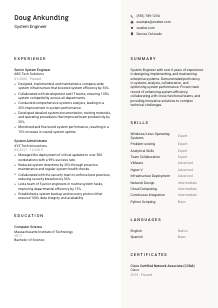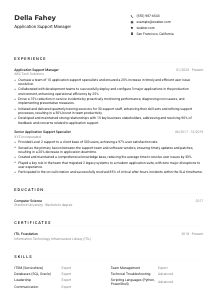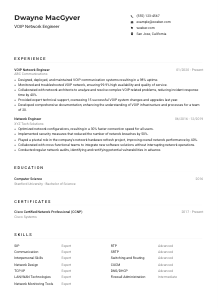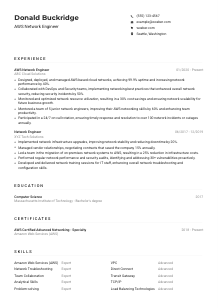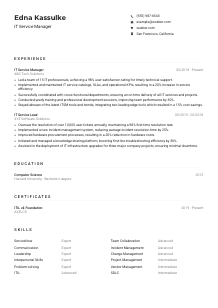System Engineer CV Example
Designing robust systems, but your CV feels like it's in safe mode? Delve into this System Engineer CV example, integrated with Wozber free CV builder. Learn how to configure your systems expertise to parallel job specifics, booting your career into an advanced run state!
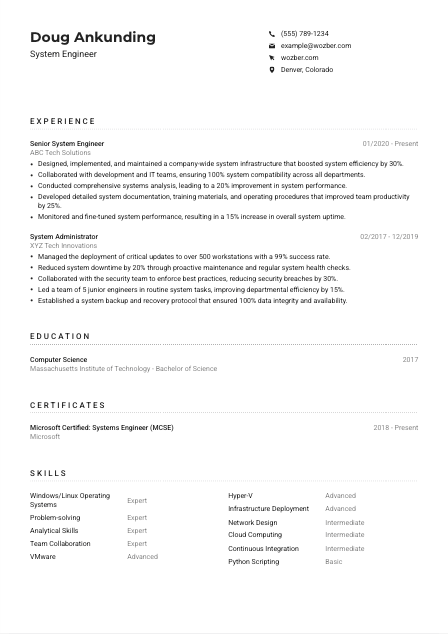
How to write a System Engineer CV?
Greetings, aspiring System Engineer! If you're on the hunt for tips on how to craft a CV that not only meets but exceeds the expectations of hiring managers, you've come to the right place. This guide, powered by Wozber free CV builder, will provide you with step-by-step instructions to create a CV that's not just a list of jobs and skills, but a compelling narrative of your career tailored to a System Engineer position.
Ready to elevate your CV game? Let's dive into creating that standout document that gets you the interview!
Personal Details
The 'Personal Details' section sets the initial tone of your CV. Though it might seem straightforward, its strategic presentation is key, especially for a System Engineer role. This portion is your first opportunity to grab attention, so let's make every word count.
1. Boldly Brand with Your Name
Your name isn't just a label; it's your brand. Highlight it with a clear, professional font, ensuring it captures attention without overwhelming the senses. Consider this as the headline of your professional story.
2. Direct with The Desired Title
Directly below your name, proudly state the role you're targeting: 'System Engineer'. This alignment with the job title from the get-go shows a clear direction in your career and reinforces the relevance of your application.
3. Craft Your Contact Details with Care
- Phone Number: Double-check to ensure accuracy. A missing or misplaced digit could mean a missed opportunity.
- Professional Email Address: Your email should echo your professionalism. A simple structure like firstname.lastname@example.com implies attention to detail.
4. Address: More Than Merely a Location
"Denver, Colorado" isn't just where you live—it's a strategic move in your job search. It directly matches the location requirement, eliminating any employer concerns regarding relocation.
5. Professional Profiles: The Virtual Handshake
Including a LinkedIn profile or personal website gives your CV depth. It's like extending a handshake in the digital world, offering a fuller picture of your professional presence.
Takeaway
Your 'Personal Details' section is the gateway to your professional narrative. A strong start here sets a confident tone for the rest of your CV. Make this section concise, professional, and reflective of your target role to ensure you're putting your best foot forward.





Experience
The 'Experience' section is where your career narrative takes shape, especially for a System Engineer. It's your chance to prove your expertise and show how your past roles fuel your future ambitions.
- Designed, implemented, and maintained a company‑wide system infrastructure that boosted system efficiency by 30%.
- Collaborated with development and IT teams, ensuring 100% system compatibility across all departments.
- Conducted comprehensive systems analysis, leading to a 20% improvement in system performance.
- Developed detailed system documentation, training materials, and operating procedures that improved team productivity by 25%.
- Monitored and fine‑tuned system performance, resulting in a 15% increase in overall system uptime.
- Managed the deployment of critical updates to over 500 workstations with a 99% success rate.
- Reduced system downtime by 20% through proactive maintenance and regular system health checks.
- Collaborated with the security team to enforce best practices, reducing security breaches by 30%.
- Led a team of 5 junior engineers in routine system tasks, improving departmental efficiency by 15%.
- Established a system backup and recovery protocol that ensured 100% data integrity and availability.
1. Analyzing the Job Description
Begin by dissecting the job posting for the System Engineer role, identifying key requirements. This initial step lays the groundwork for aligning your experience with what the employer is seeking.
2. Structuring Your Professional Journey
Present your roles in reverse chronological order, focusing on outcomes and achievements rather than daily tasks. For the System Engineer position, highlight moments where you made measurable impacts—like system efficiency improvements.
3. Narrating Your Success Stories
Transform your responsibilities into accomplishments. Phrases like 'Boosted system efficiency by 30%' catch the eye and paint a vivid picture of your capabilities and impact.
4. The Power of Quantification
Whenever possible, use numbers to quantify your impact. This concretizes your achievements, making them more tangible and impactful to the hiring manager.
5. Focusing on Relevance
Stay strictly relevant to the System Engineer role. Extraneous achievements, regardless of how proud they make you, can distract from the targeted narrative you're trying to build.
Takeaway
Your 'Experience' section should be a carefully curated showcase of your professional journey, specifically tailored to demonstrate your suitability for the System Engineer role. Highlight significant achievements and quantify your impact to portray a candid picture of your potential.
Education
The 'Education' section substantiates your technical and theoretical foundation, essential for a System Engineer. It's not just about listing degrees; it's about showcasing your preparedness for the role.
1. Matching the Degree Requirement
"Bachelor's degree in Computer Science, Engineering, or a related field" – match this requirement from the job description to confirm your eligibility from an educational standpoint.
2. Presenting Your Academic Credentials
List your education in a straightforward manner: degree, field of study, institution, and graduation year. For a System Engineer applicant, clarity in this section is key.
3. Highlighting Degree Specifics
If your degree directly relates to the System Engineer role, make it a focal point. Your educational background should clearly reflect the skills and knowledge base required for the position.
4. Relevant Coursework and Projects
Although not always necessary, discussing relevant coursework or projects can add value, particularly if they align closely with the System Engineer role's requirements.
5. Supplementary Academic Achievements
If you have additional academic achievements that underscore your suitability for the position—such as honors or relevant extracurricular activities—include them, but prioritize brevity.
Takeaway
Your 'Education' section is a testament to your foundational capabilities as a System Engineer. Ensure it's accurately aligned with the job requirements, concise, and highlights the most relevant aspects of your academic journey.
Certificates
In the field of system engineering, certifications can significantly bolster your profile. They demonstrate ongoing learning and specialization—a crucial aspect for a System Engineer.
1. Identifying Relevant Certifications
Pinpoint certifications mentioned or implied in the job description. Recognized certifications like 'MCSE, CCNA, or RHCE' directly align with the expectations for a System Engineer position.
2. Choosing Quality Over Quantity
It's tempting to list every certification you've earned. However, focus on those most relevant to the System Engineer role—this emphasizes your targeted expertise.
3. Date Accuracy and Timelines
Adding dates to certifications (acquisition or expiry) can be critical, particularly in tech fields where up-to-date knowledge is paramount. Make sure these dates reflect your current qualifications.
4. Engaging in Continuous Learning
The technology sector evolves rapidly, and so should your knowledge base. Pursue ongoing education and certifications that align with your career trajectory as a System Engineer.
Takeaway
Carefully selected and up-to-date certifications can significantly elevate your System Engineer CV. They underscore your commitment to your profession and ongoing learning, setting you apart from other candidates.
Skills
The 'Skills' section of your CV is a concise display of your professional capabilities. For a System Engineer, it's vital to showcase both technical prowess and soft skills in a balanced manner.
1. Analyzing the Job Post
Carefully extract both explicit and implicit skills from the job description. Knowledge in 'Windows/Linux Operating Systems' and experience with 'VMware and Hyper-V' are examples of skills directly drawn from the job requirements.
2. Matching and Highlighting Relevant Skills
Prioritize listing skills that directly mirror the job's demands. This assures the hiring manager of your proficiency and alignment with the position's needs.
3. Organisation and Precision
Avoid the temptation to list every skill you've acquired. Focus instead on those most relevant to a System Engineer role, ensuring clarity and direct relevance to the position.
Takeaway
Your 'Skills' section is a prime opportunity to align yourself with the requirements of the System Engineer role. Handpick skills that resonate with the job's description, portraying yourself as the ideal candidate with a bespoke set of professional tools.
Languages
For System Engineers working in an increasingly globalized world, language skills can be a unique asset. This section isn't just about listing languages—it's about showing how your linguistic capabilities can contribute to your role.
1. Assessing the Job's Language Requirements
Begin by identifying if the job posting lists specific language skills, like a "strong ability to communicate in English." This helps tailor your language section directly to the job's needs.
2. Prioritizing Primary Languages
If the job description mentions a required language, list it prominently and indicate your level of proficiency, ensuring it meets the job's criteria.
3. Including Additional Languages
While English might be the primary language for the position, including other languages you speak can showcase your versatility and global communication skills.
4. Honest Proficiency Levels
Be transparent about your language skill levels. Clear descriptors like 'native,' 'fluent,' 'intermediate,' and 'basic' give a true representation of your abilities.
5. Considering the Broader Role Context
In positions where communication with international teams or clients is expected, showcasing your multilingual skills could give you an edge in the selection process.
Takeaway
Language skills can distinguish your System Engineer CV, especially in roles requiring communication with diverse teams. Listing languages with honesty about your proficiency reflects both your communication skills and cultural sensitivity.
Summary
The 'Summary' section is your elevator pitch, encapsulating your identity as a System Engineer. It offers a snapshot of your professional narrative, bridging past achievements with future aspirations.
1. Deciphering the Job Essence
Start by absorbing the essence of the job description. This ensures your summary aligns with what the hiring manager is searching for in a System Engineer candidate.
2. Beginning with a Strong Introduction
Initiate your summary with a strong statement about your profession and experience level, setting the stage for a compelling narrative.
3. Incorporating Key Achievements and Skills
Weave in a few key skills and notable achievements, emphasizing how they pertain to the System Engineer role. This shows you're not just qualified; you're a cut above the rest.
4. Conciseness is Key
The summary should be brief yet impactful, drawing the reader in and making them want to learn more about your professional journey.
Takeaway
An effectively tailored summary sets the tone for your entire CV, offering a glimpse of your professional expertise and ambitions. For a System Engineer, it's crucial this section resonates with the job specifics, enticing the hiring manager to delve deeper into your CV.
Launching Your System Engineer Career with a Tailored CV
You are now equipped to craft a targeted CV that showcases your unique qualifications as a System Engineer. By attentively aligning every section of your CV with the specific demands of your desired role, you're not just submitting an application—you're making a compelling case for your candidacy. Remember, the free CV builder at Wozber is ready to assist you in creating an ATS-compliant CV with a professional ATS-friendly CV template and detailed guidance on ATS optimisation using an ATS CV scanner.
Your journey towards a thrilling System Engineer role is just a CV away. Let your talents shine through a meticulously crafted CV and step confidently into your next professional adventure.

- Bachelor's degree in Computer Science, Engineering, or a related technical discipline.
- Minimum of 5 years of experience in systems engineering, network design, and infrastructure deployment.
- In-depth knowledge of Windows/Linux operating systems and virtualization technologies such as VMware or Hyper-V.
- Strong analytical and problem-solving skills with the ability to work in a collaborative team environment.
- Possession of or ability to obtain industry-recognized certifications such as MCSE, CCNA, or RHCE.
- Strong ability to communicate in English necessary.
- Must be located in or willing to relocate to Denver, Colorado.
- Design, implement, and maintain enterprise-wide systems and infrastructures.
- Collaborate with cross-functional teams to ensure system compatibility and integration.
- Conduct systems analysis and provide recommendations for system improvements.
- Assist in the development of system documentation, training materials, and operating procedures.
- Monitor system performance and implement tuning improvements to ensure optimal system efficiency.





